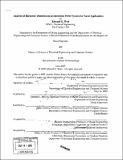Analysis of harmonic distortion in an Integrated Power System for naval applications
Author(s)
West, Edward G., S.M. Massachusetts Institute of Technology
DownloadFull printable version (11.50Mb)
Other Contributors
Massachusetts Institute of Technology. Dept. of Electrical Engineering and Computer Science.
Advisor
Timothy J. McCoy.
Terms of use
Metadata
Show full item recordAbstract
This research quantifies the voltage distortion over the broad range of operating conditions experienced by a Naval warship. A steady state model of an Integrated Power System (IPS) was developed in a commercially available power system simulation tool. The system chosen for this study was a three-phase, 4160 VAC, 80 MW power system with a 450 VAC bus to supply traditional ship service loads. Sensitive loads, such as combat systems equipment, are isolated from the harmonic content of the 450 volt bus via solid state inverters. Power generation for this system included two 30 MW and two 10 MW generators. The sizing of these generators was based on operating configurations that would result in the best fuel efficiency under the most common loading conditions. Model components were simulated and compared to data recorded for the U.S. Navy's Full Scale Advanced Development (FSAD) test system for the IPS at the Philadelphia Land Based Engineering Site (LBES). The propulsion motor used in the simulations was developed based on the advanced induction motor installed at LBES. (cont.) Various loading conditions, including battle, cruise and anchor were simulated for both 10⁰F and 90⁰F ambient design conditions and with propulsion loads ranging from 0% to 100%. Numerous system configuration changes were implemented to determine their impact on system harmonics. These included operating the propulsion converter front end rectifiers in both controlled (varying commutation angle) and uncontrolled (diode bridge) configurations; implementation of both twelve and six pulse rectification; and installation of a tuned passive 5th harmonic filter. The simulation results are compared to both IEEE Std 519-1992 and Mil-Std 1399.
Description
Thesis (Nav. E.)--Massachusetts Institute of Technology, Dept. of Ocean Engineering; and, (S.M.)--Massachusetts Institute of Technology, Dept. of Electrical Engineering and Computer Science, 2005. Includes bibliographical references (p. 89-91).
Date issued
2005Department
Massachusetts Institute of Technology. Department of Electrical Engineering and Computer Science; Massachusetts Institute of Technology. Department of Ocean EngineeringPublisher
Massachusetts Institute of Technology
Keywords
Ocean Engineering., Electrical Engineering and Computer Science.